16 May 2016 | Art and the Law Commentary, Artistic Freedom Commentary and Reports, Campaigns -- Featured, mobile, News and features
Julia Farrington, associate arts producer, Index on Censorship, participated in the Theatre UK 2016 conference on 12 May 2016. This is an adapted version of her presentation.
In January 2013 I organised a conference called Taking the Offensive for Index on Censorship, in partnership with the Free Word Centre and Southbank Centre. The conference was held to debate the growth of self-censorship in contemporary culture, the social, political and legal challenges to artistic freedom of expression and the sources of these new challenges.
The report from the conference concluded that censorship and self-censorship are significant influences in the arts, creating a complex picture of the different ways society controls expression. Institutional self-censorship, which many acknowledged suppresses creativity and ideas, was openly discussed for the first time.
Lack of understanding and knowledge about rights and responsibilities relating to freedom of expression, worries about legal action, police intervention and loss of funding, health and safety regulations, concern about provoking negative media and social media reaction, and public protests are all causing cultural institutions to be overly cautious.
One speaker at Taking the Offensive suggested that we are fostering a culture where “art is not for debate, controversy and disagreement, but it is to please”.
There is above all, unequal access to exercising the right to artistic freedom of expression, with artists from black and minority ethnic encountering additional obstacles.
Many felt that far greater trust, transparency and honesty about the challenges being faced need to be developed across the sector; dilemmas should be recast as a necessary part of the creative process, to be shared and openly discussed, rather than something to keep behind closed doors. This will make it possible for organisations to come together when there is a crisis, rather than standing back and withholding support: “if we collectively don’t feel confident about the dilemmas we face how can we move on with the public?”
I think there have been significant changes in the three years since the conference and, whilst I think the same challenges persist, there have been some really positive moves to tackle self-censorship within the sector. The growth of What Next? has created precisely the platform to debate and discuss the pressures, dilemmas and controversies that the conference identified. What Next? has produced guidance on navigating some of these issues and is developing more resources on how organisations can support each other when work is contested.
Index on Censorship responded to the clear call from the conference for the need for guidance about legal rights and responsibilities if we are to create a space where artists are free to take on complex issues that may be disturbing, divisive, shocking or offensive.
We have published information packs around five areas of law that impact on what is sayable in the arts: Public Order, Race and Religion, Counter Terrorism, Child Protection and Obscene Publications. They are available on the website under our campaign Art and Offence. These have been well received by the sector and read by CPS and police and we are developing a programme of training which will, if all goes well, include working with senior police officers.
At the same time, pressures from outside the sector have intensified.
The role of the police in managing the public space when controversial art leads to protest has come into sharp relief over the past two-three years where they have repeatedly “advised” venues to remove or cancel work that has caused protest or may cause protest.
I did a case study on the policing of the picket of Exhibit B at the Barbican in London which is available on the Index website; and in the same year, the Israeli hip hop opera the City was closed in Edinburgh on the advice of the police.
More worryingly the police “advice” has also led to the foreclosing of work that is potentially inflammatory – as in Isis Threaten Sylvannia an art installation by Mimsy, that was removed from an exhibition called Passion for Freedom from the Mall Gallery last year.
With the removal of Isis Threaten Sylvania, we see a shift from the police advising closure following protest to the police contributing indirectly or directly to the decision to remove work to avoid protest.
In this case freedom of expression was actually given a price — set at £7,200 per day for the five days of the exhibition — the price set by the police for their services to guarantee public safety.
The police took the view that a perfectly legal piece of art, which had already been displayed without incident earlier in the year, was inflammatory. And in the balance of things as they stand, this opinion outweighs:
- the right of the artist to express him or herself;
- the organisation’s right to present provocative political art;
- the audience’s right to view it;
- and those that protest against it, the right to say how much they hate it, including when that means that they want the art removed.
This new chapter in the policing of controversial art sets alarm bells ringing and represents a very dangerous precedent for foreclosing any work that the police don’t approve of.
But going against police advice is problematic.
In Index’s information pack on Public Order we asked our legal adviser, working pro bono, questions that many artists and arts managers are concerned about:
What happens if police advise you not to continue with presenting a piece of work because they have unspecified concerns about public safety – and yet tell you it is your choice and they can only advise you?
The artist would in principle be free to continue with the work. It would be advisable, however, to ensure that the reasons held by the police were understood. It may also be prudent to take professional advice…
And then what responsibilities for safety do employers have to staff and the public in relation to continuing with an artwork that has been contested by the police?
An organisation also has duties to their employees and members of the public on their premises. These duties may extend to making an organisation liable in the event of injury to a person resulting from the unlawful act of a third party if, for example, that unlawful act was plainly foreseeable – in other words the police have given their warning.
What are the options for an arts organisation to challenge police advice at the time of the protest itself?
If the organisation believes that it has grounds to challenge police directions to avoid a breach of the peace, it can seek to take legal action on an urgent basis. Realistically…legal action will not be determined until some time later and until it is determined by the courts, the organisation and/or its members or employees would risk arrest if they do not comply with police directions.
So – what starts out as police advice which implies genuine choice, on closer inspection transforms into a Hobson’s Choice where failure to follow that advice could lead to arrest.
On this evidence, both self-censorship and direct censorship are the undesirable outcomes of this as yet unchallenged area of policing.
But the Crown Prosecution Service has read and approved the packs and our law packs are in the system with the police.
The ideal policing scenario is to keep the space open for both the challenging political art and the protest it provokes. Both are about freedom of expression, what we have to avoid is the heckler’s veto prevailing.
Going back to other recent examples of censorship — questions remain about the role of the police in the decision to cancel Homegrown the National Youth Theatre production of a play about the radicalisation of young Muslims by writer Omar El-Khairy and director Nadia Latif. This was followed earlier this year by the presentation, without incident, of Another World: Losing our Children to Islamic State at the National Theatre, play on similar themes by Gillian Slovo and Nicolas Kent.
I mention Another World because it is important to state the obvious, that all the work that has been contested by the police and been cancelled, relates to work about race and religion and the majority of artists involved in work that has been foreclosed are from black and minority ethnic communities.
Looking through the lens of freedom of expression, each case of censorship gives a valuable opportunity to view a specific snapshot of relationships within society and to analyse the power dynamics operating there, both directly around the censored work — whose voices are and aren’t being heard in the work itself, and in the field and context in which the work is taking place and again looking at who is in control, who decides what voices are heard. I don’t have time here to go into an analysis of each case, but what emerges is that freedom of expression is, as it stands, a biased affair in the UK and I believe will remain so while our society and our culture are not equal.
As well as these new cases of censorship that we have seen since the 2013 conference, we have also seen new government policy, legislation and regulations which place increasingly explicit controls on what we can say and have a chilling effect on many areas of expression and communication, and interaction with government.
Many campaigners and charities see the Criminal Justice and Courts Act 2015 as designed to deter charities from intervening in judicial reviews — the most important legal channel we have to call authorities to account; the Investigatory Powers Bill, better known as the Snoopers’ Charter gives the surveillance state more powers; the Prevent Strategy requires us to police each other – surveillance and policing our neighbours — two nasty authoritarian tactics, and most recently the anti-advocacy clause would effectively ban organisations from using government funds for lobbying — stifling dissent. It was due to come into law on 1 May but the consultation period was extended and it might be kicked into the long grass.
The government has made it clear that it wants us to see ourselves predominantly if not exclusively as businesses and in response we have successfully made the case that the arts contribute massively to the economy.
But we know we are so much more. The arts are a vital, at best magnificent and effective player in civil society — especially when you define civil society as “a community of citizens linked by common interests and collective activity”.
With our core values and freedoms under attack, the arts and other civil society bodies are responding. The discussion about the role of the artist in taking on the big issues in society — from climate change to the refugee crisis — has, from where I stand, definitely intensified and gone up the agenda over the past three years, both here and internationally, as the pressure on our freedoms and values also intensifies domestically and internationally.
To fully participate in society and to create art that calls power to account, we need to continue to identify, analyse and tackle the causes of self-censorship within the sector, and stand together to enter into dialogue with the various agents of control that we identify in the process.
Art can help us imagine and bring about a more equal and just future.
15 Apr 2016 | Awards, mobile, News and features
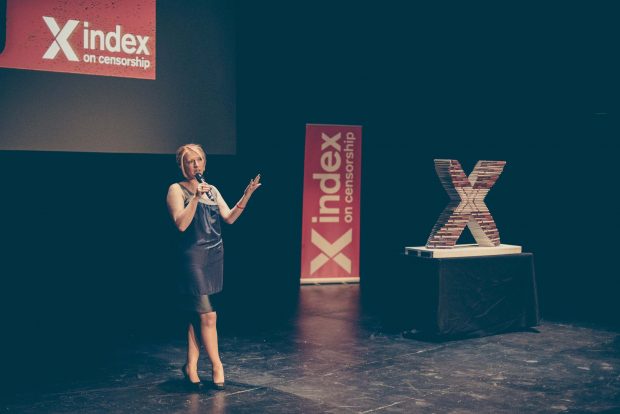
Index on Censorship CEO Jodie Ginsberg (Photo: Elina Kansikas for Index on Censorship)
You can donate to Index on Censorship here.
This is the text of a speech give by Index on Censorship CEO Jodie Ginsberg at the Freedom of Expression Awards on April 13, 2016.
In the very first edition of Index on Censorship magazine – published in 1972 – the then editor Michael Scammell wrote that a definite need existed for such an organisation… only time will tell whether the need is temporary or permanent.
Sadly, 43 years later – as evidenced by tonight’s winners – the need seems permanent. Our aim though, remains to be temporary – our goal is nothing less than an end to all censorship. That’s some target, but if those whom we have honoured here this evening have shown us anything, I hope it’s that is this a target worth aiming for.
Index challenges censorship and celebrates the value of free expression in four ways. The first is through the publication of works by censored writers and artists and about censorship.
We do this through our magazine, a copy of which you all receive this evening, and through our website and social media. If you want a reminder of how censorship remains as live an issue as it was in 1972, in this issue you will find a story from Azeri playwright and poet Akram Aylisi, whose books were burned and his title of “People’s Writer” revoked after he dared to discuss the Armenian genocide. Just this month he was barred from leaving the country.
We challenge censorship through campaigning. This year we will be campaigning along with other like-minded organisations to ensure the government’s planned new extremism bill contains none of its proposed new curbs on free speech.
We challenge by encouraging debate such as one held here at Unicorn Theatre last year following the cancellation of Homegrown — whose director Nadia was one of tonight’s guest presenters, by the National Youth Theatre.
And we challenge censorship by supporting those on the frontlines of its defence. Each of tonight’s winners becomes an Index fellow and we will work with them for the next year to help make sure we can magnify their impact at home and abroad.
We have heard stories tonight of what censorship means in practice. Tonight I want to share with you another slice of Index history: a video made for Index 30 years ago that I think drives home all of those stories.
Free expression needs defenders. It needs defenders to ensure that Zunar does not go to prison for 43 years – another Index lifetime – for drawing cartoons of Malaysia’s Prime Minister. It needs defenders to help ensure that the world in which Zaina’s six-week-old baby, who joined her in London this week, grows up to be a woman who can speak freely, and – if she so chooses – report freely. It needs defenders so that Nabeel Rajab, one of this year’s awards judges, is free to travel and speak freely without fear of jail, harassment or torture.
So what I want you to do this evening is very simple. I want you to reach into your programme and take out the pledge card you’ll find there. Then I want you to take a moment to think what you might otherwise have spent this evening. Then I want you to take a pen and write down that figure – or a higher one – to help ensure that Index can continue to defend free speech. If you can’t do analogue, you can text FEXY16 £10 to give us £10 right now. We might not end censorship immediately but with your help we can make ourselves a little less permanent.
Thank you. To end this evening I am delighted to introduce Martyn Ware, who will present our inaugural Music In Exile Fellowship.
The MIEF is a joint initiative with the producers of the film Music in Exile, which explores the plight of Mali’s musicians after jihadists banned music in the country. Moved by their experiences, producers Johanna Schwartz and Sarah Mosses approached Index to see what we could do to support persecuted artists like those featured in the film. Indeed, one group featured, Songhoy Blues, was shortlisted for an Arts award last year. The MIEF, funded through money from special screenings of the film and other events, will support one musician each year as part of the Index awards fellowship. I’m delighted that MW of Human League and Heaven 17 fame is here to present it.
#IndexAwards2016
Index announces winners of 2016 Freedom of Expression Awards
2016 Freedom of Expression Awards: The acceptance speeches
Bolo Bhi: “What’s important is the process, and that we keep at it”
Zaina Erhaim: “I want to give this award to the Syrians who are being terrorised”
GreatFire: “Technology has been used to censor online speech — and to circumvent this censorship”
Murad Subay: “I dedicate this award today to the unknown people who struggle to survive”
Smockey: “The people in Europe don’t know what the governments in Africa do.”
7 Mar 2016 | Europe and Central Asia, Mapping Media Freedom, News and features, Turkey
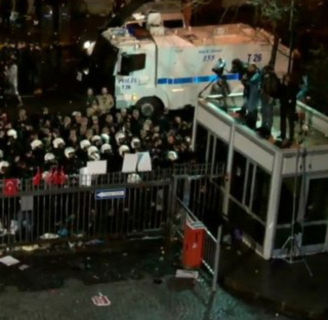 On Friday night, security forces stormed Zaman, the widest-circulating Turkish newspaper. Though many Turkish news outlets studiously avoided covering the raids, the screens of international news channels were full of images of Turkish police using tear gas and water cannon against protestors trying to protect their paper. Particularly striking were the injuries to young women wearing Islamic headgear, the very segment of the community, which the ruling Justice and Development Party (AKP) once vowed to defend.
On Friday night, security forces stormed Zaman, the widest-circulating Turkish newspaper. Though many Turkish news outlets studiously avoided covering the raids, the screens of international news channels were full of images of Turkish police using tear gas and water cannon against protestors trying to protect their paper. Particularly striking were the injuries to young women wearing Islamic headgear, the very segment of the community, which the ruling Justice and Development Party (AKP) once vowed to defend.
The seizure of a news organisation by placing it into court-appointed administration is not trivial. The Zaman group employs some two thousand people, runs a nationwide network of correspondents and puts out an English language daily, Today’s Zaman, which has an international following on the web. It is impossible to imagine a court in any country with the slightest pretension of being democratic acting with such impunity.
The final headline of the independent version of Zaman was that there could be no legal basis for the takeover. Indeed, Article 30 of the Turkish Constitution reads: “A printing house and its annexes, duly established as a press enterprise under law, and press equipment shall not be seized, confiscated, or barred from operation on the grounds of having been used in a crime.” (As amended on May 7, 2004; Act No. 5170)”
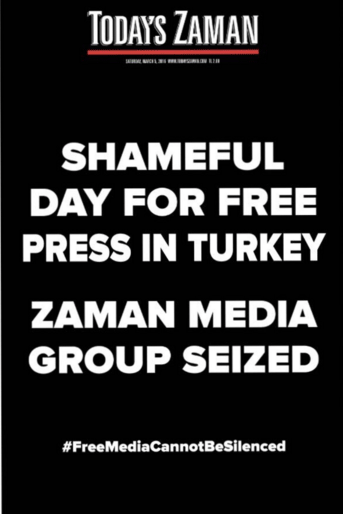 It is no secret that Zaman demonstrated fidelity to the movement associated with the exiled cleric, Fethullah Gülen. The paper once supported the rise of AKP but in recent years has been a bitter critic. The legal document, which placed Zaman’s parent company into court-appointed administration, relies on the testimony of an anonymous witness who maintains that the editorial policy was dictated by what it calls the Fethullah Terror Organisation (FETÖ in its Turkish acronym). This in turn is guilty of conspiring with the outlawed Kurdistan Workers Party (PKK). It is enough to point out that the existence of FETÖ is at best hearsay, at worst the invention of subeditors in the pro-government press – never mind that Zaman itself once took a more hawkish line towards the PKK than the government itself.
It is no secret that Zaman demonstrated fidelity to the movement associated with the exiled cleric, Fethullah Gülen. The paper once supported the rise of AKP but in recent years has been a bitter critic. The legal document, which placed Zaman’s parent company into court-appointed administration, relies on the testimony of an anonymous witness who maintains that the editorial policy was dictated by what it calls the Fethullah Terror Organisation (FETÖ in its Turkish acronym). This in turn is guilty of conspiring with the outlawed Kurdistan Workers Party (PKK). It is enough to point out that the existence of FETÖ is at best hearsay, at worst the invention of subeditors in the pro-government press – never mind that Zaman itself once took a more hawkish line towards the PKK than the government itself.
According to reports reaching P24, the prosecutor struggled to find a court which would accede to his request. The Zaman building is in the Bakırköy province of Istanbul and comes under its jurisdiction. However, the request in the Bakırköy court was refused. Finally another, more friendly court acceded to the prosecutor’s demand, even though it is dubious whether it had the competence to do so.
The paper may not be guilty of treason but is has been guilty of apostasy – of having turned its back on AKP and President Tayyip Erdoğan in particular. Since then the two have been in mortal combat. Loyalists to the Gülen movement and the Zaman group in particular pursued corruption allegations against leading government officials in December 2013.
By forcing Zaman’s takeover the government lays itself open to universal condemnation. Turkey, once a proud EU applicant, now plumbs the lower depths of global rankings of transparency and free expression. Sadder still, this does not seem to trouble it a jot.
“The timing is a slap in the face,” according to a diplomat quoted in The Financial Times. “The seizure came during a visit to Istanbul by Donald Tusk, the European Council president, and two days before Angela Merkel, the German chancellor, is to see Ahmet Davutoğlu, the Turkish premier,” the paper points out. Turkey now calibrates its place in the world not as a democratic standard bearer in a troubled part of the globe but as a buffer zone between Fortress Europe and a tide of Syrian refugees. This, it believes, gives it licence to get away with the murder of a newspaper.
In Turkey all eyes, government and opposition, are on the EU to see if Brussels is prepared to put expediency above principle and if European pubic opinion is prepared to see Ankara give up all pretence of democratic governance in exchange for grudging cooperation on Syria.
It is not just the timing of the EU summit, which is significant. The Constitutional Court recently gave the presidential office a swift kick in the shins with the release from pre-trial detention of the editor-in-chief of Cumhuriyet newspaper along with his Ankara bureau chief. The high court ruled that the charges against them – that printing stories in a newspaper could correspond to treason – were essentially absurd. Since then, newspapers and ministers loyal to the president have been braying for the judges’ blood. The president himself has said he would neither respect nor abide by the high court’s decision and now appears even more determined to draft a new constitution which would allow him to do exactly that.
Not everyone in AKP supports this autocratic trend. There is a small wave of discontent from the old guard who believe a constitution that concentrates even greater powers in presidential hands is a dangerous step. These homegrown dissidents took quiet satisfaction in the court’s defence of Cumhuriyet. So one can see the raid against Zaman as the president re-asserting his authority against these pockets of resistance to one-man rule.
Turkey’s 1982 Constitution was prepared under conditions of martial law. It attempted to dictate a society in which the rights of citizen were subservient to the needs of the state. This rendered it anachronistic before the ink on the Official Gazette was dry. It has constantly been rewritten and there have been consistent demands that it be replaced.
Yet no one, not even in their wildest babblings, ever claimed the current Constitution was insufficiently authoritarian, or that it ceded too little power to the arbitrary whim of government, or that it failed to enshrine the Machiavellian principle that “might makes right”.
No one, that is, until now. As the ink on the printing presses of Turkey’s independent media run dry so too do hopes for the country’s future.
See also:
Statement: Index condemns seizure of Zaman
Sign our petition: End Turkey’s crackdown on press freedom
Letter: Writers and artists condemn seizure of Zaman news group
Reaction: Turkish court orders seizure of Zaman news group
Originally posted on Platform 24.
7 Jan 2016 | France, Mapping Media Freedom, News and features, Statements, United Kingdom
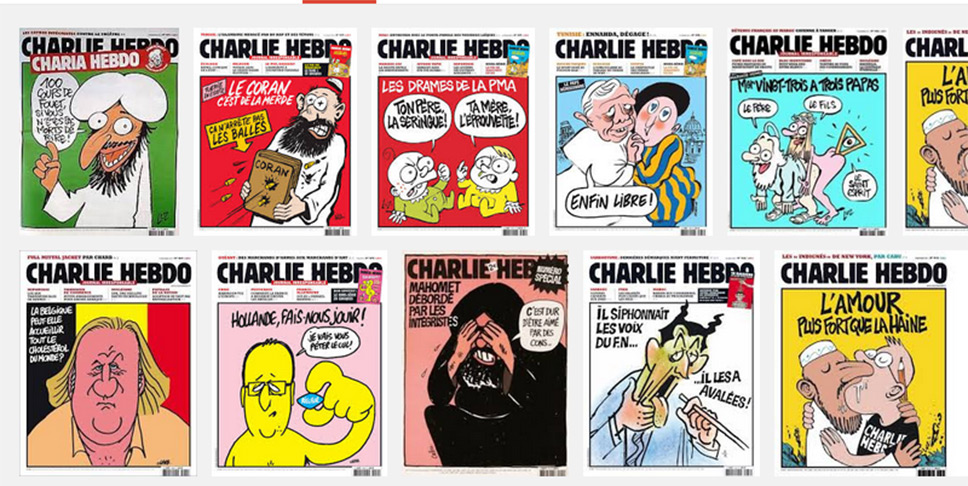
When I started working at Index on Censorship, some friends (including some journalists) asked why an organisation defending free expression was needed in the 21st century. “We’ve won the battle,” was a phrase I heard often. “We have free speech.”
There was another group who recognised that there are many places in the world where speech is curbed (North Korea was mentioned a lot), but most refused to accept that any threat existed in modern, liberal democracies.
After the killing of 12 people at the offices of French satirical magazine Charlie Hebdo, that argument died away. The threats that Index sees every day – in Bangladesh, in Iran, in Mexico, the threats to poets, playwrights, singers, journalists and artists – had come to Paris. And so, by extension, to all of us.
Those to whom I had struggled to explain the creeping forms of censorship that are increasingly restraining our freedom to express ourselves – a freedom which for me forms the bedrock of all other liberties and which is essential for a tolerant, progressive society – found their voice. Suddenly, everyone was “Charlie”, declaring their support for a value whose worth they had, in the preceding months, seemingly barely understood, and certainly saw no reason to defend.
The heartfelt response to the brutal murders at Charlie Hebdo was strong and felt like it came from a united voice. If one good thing could come out of such killings, I thought, it would be that people would start to take more seriously what it means to believe that everyone should have the right to speak freely. Perhaps more attention would fall on those whose speech is being curbed on a daily basis elsewhere in the world: the murders of atheist bloggers in Bangladesh, the detention of journalists in Azerbaijan, the crackdown on media in Turkey. Perhaps this new-found interest in free expression – and its value – would also help to reignite debate in the UK, France and other democracies about the growing curbs on free speech: the banning of speakers on university campuses, the laws being drafted that are meant to stop terrorism but which can catch anyone with whom the government disagrees, the individuals jailed for making jokes.
And, in a way, this did happen. At least, free expression was “in vogue” for much of 2015. University debating societies wanted to discuss its limits, plays were written about censorship and the arts, funds raised to keep Charlie Hebdo going in defiance against those who would use the “assassin’s veto” to stop them. It was also a tense year. Events discussing hate speech or cartooning for which six months previously we might have struggled to get an audience were now being held to full houses. But they were also marked by the presence of police, security guards and patrol cars. I attended one seminar at which a participant was accompanied at all times by two bodyguards. Newspapers and magazines across London conducted security reviews.
But after the dust settled, after the initial rush of apparent solidarity, it became clear that very few people were actually for free speech in the way we understand it at Index. The “buts” crept quickly in – no one would condone violence to deal with troublesome speech, but many were ready to defend a raft of curbs on speech deemed to be offensive, or found they could only defend certain kinds of speech. The PEN American Center, which defends the freedom to write and read, discovered this in May when it awarded Charlie Hebdo a courage award and a number of novelists withdrew from the gala ceremony. Many said they felt uncomfortable giving an award to a publication that drew crude caricatures and mocked religion.
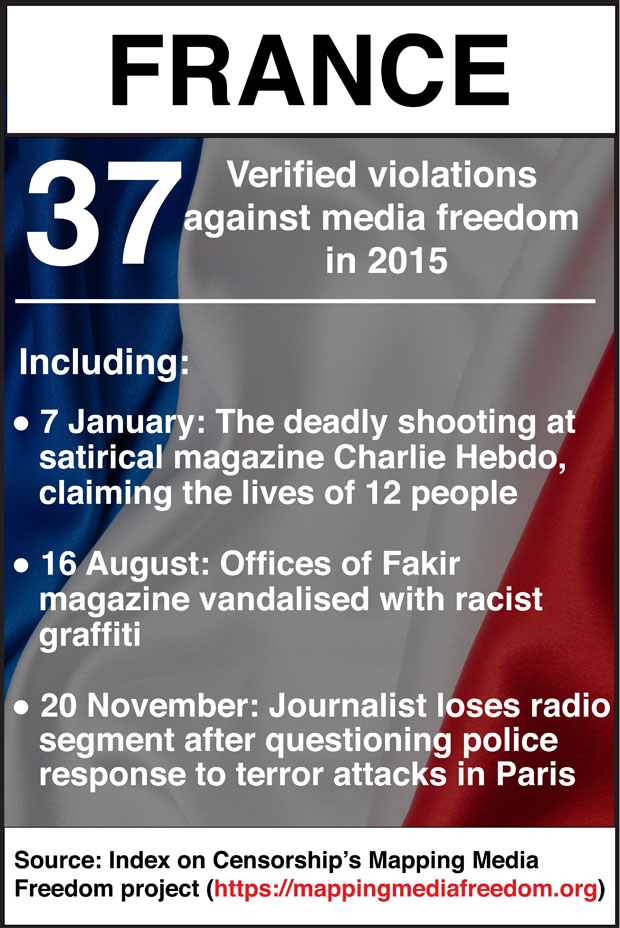
Index’s project Mapping Media Freedom recorded 745 violations against media freedom across Europe in 2015.
The problem with the reaction of the PEN novelists is that it sends the same message as that used by the violent fundamentalists: that only some kinds of speech are worth defending. But if free speech is to mean anything at all, then we must extend the same privileges to speech we dislike as to that of which we approve. We cannot qualify this freedom with caveats about the quality of the art, or the acceptability of the views. Because once you start down that route, all speech is fair game for censorship – including your own.
As Neil Gaiman, the writer who stepped in to host one of the tables at the ceremony after others pulled out, once said: “…if you don’t stand up for the stuff you don’t like, when they come for the stuff you do like, you’ve already lost.”
Index believes that speech and expression should be curbed only when it incites violence. Defending this position is not easy. It means you find yourself having to defend the speech rights of religious bigots, racists, misogynists and a whole panoply of people with unpalatable views. But if we don’t do that, why should the rights of those who speak out against such people be defended?
In 2016, if we are to defend free expression we need to do a few things. Firstly, we need to stop banning stuff. Sometimes when I look around at the barrage of calls for various people to be silenced (Donald Trump, Germaine Greer, Maryam Namazie) I feel like I’m in that scene from the film Lock, Stock and Two Smoking Barrels where a bunch of gangsters keep firing at each other by accident and one finally shouts: “Could everyone stop getting shot?” Instead of demanding that people be prevented from speaking on campus, debate them, argue back, expose the holes in their rhetoric and the flaws in their logic.
Secondly, we need to give people the tools for that fight. If you believe as I do that the free flow of ideas and opinions – as opposed to banning things – is ultimately what builds a more tolerant society, then everyone needs to be able to express themselves. One of the arguments used often in the wake of Charlie Hebdo to potentially excuse, or at least explain, what the gunmen did is that the Muslim community in France lacks a voice in mainstream media. Into this vacuum, poisonous and misrepresentative ideas that perpetuate stereotypes and exacerbate hatreds can flourish. The person with the microphone, the pen or the printing press has power over those without.
It is important not to dismiss these arguments but it is vital that the response is not to censor the speaker, the writer or the publisher. Ideas are not challenged by hiding them away and minds not changed by silence. Efforts that encourage diversity in media coverage, representation and decision-making are a good place to start.
Finally, as the reaction to the killings in Paris in November showed, solidarity makes a difference: we need to stand up to the bullies together. When Index called for republication of Charlie Hebdo’s cartoons shortly after the attacks, we wanted to show that publishers and free expression groups were united not by a political philosophy, but by an unwillingness to be cowed by bullies. Fear isolates the brave – and it makes the courageous targets for attack. We saw this clearly in the days after Charlie Hebdo when British newspapers and broadcasters shied away from publishing any of the cartoons featuring the Prophet Mohammed. We need to act together in speaking out against those who would use violence to silence us.
As we see this week, threats against freedom of expression in Europe come in all shapes and sizes. The Polish government’s plans to appoint the heads of public broadcasters has drawn complaints to the Council of Europe from journalism bodies, including Index, who argue that the changes would be “wholly unacceptable in a genuine democracy”.
In the UK, plans are afoot to curb speech in the name of protecting us from terror but which are likely to have far-reaching repercussions for all. Index, along with colleagues at English PEN, the National Secular Society and the Christian Institute will be working to ensure that doesn’t happen. This year, as every year, defending free speech will begin at home.

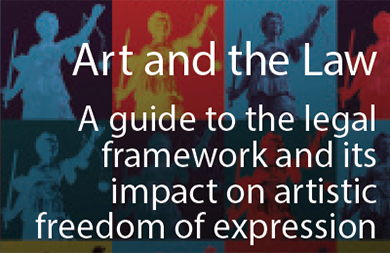
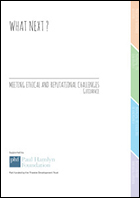
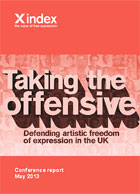
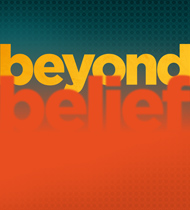

 On Friday night,
On Friday night,  It is no secret that Zaman demonstrated fidelity to the movement associated with the exiled cleric, Fethullah Gülen. The paper once supported the rise of AKP but in recent years has been a bitter critic. The legal document, which placed Zaman’s parent company into court-appointed administration, relies on the testimony of an anonymous witness who maintains that the editorial policy was dictated by what it calls the Fethullah Terror Organisation (FETÖ in its Turkish acronym). This in turn is guilty of conspiring with the outlawed Kurdistan Workers Party (PKK). It is enough to point out that the existence of FETÖ is at best hearsay, at worst the invention of subeditors in the pro-government press – never mind that Zaman itself once took a more hawkish line towards the PKK than the government itself.
It is no secret that Zaman demonstrated fidelity to the movement associated with the exiled cleric, Fethullah Gülen. The paper once supported the rise of AKP but in recent years has been a bitter critic. The legal document, which placed Zaman’s parent company into court-appointed administration, relies on the testimony of an anonymous witness who maintains that the editorial policy was dictated by what it calls the Fethullah Terror Organisation (FETÖ in its Turkish acronym). This in turn is guilty of conspiring with the outlawed Kurdistan Workers Party (PKK). It is enough to point out that the existence of FETÖ is at best hearsay, at worst the invention of subeditors in the pro-government press – never mind that Zaman itself once took a more hawkish line towards the PKK than the government itself.
